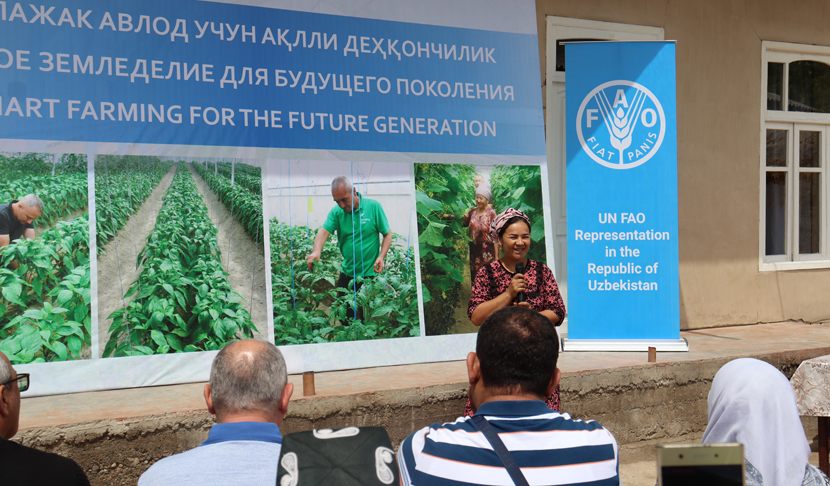Food and Agriculture Organization of the United Nations (FAO) held a Field Day in Beshkapa mahalla in Namangan region on 20 May 2022. This was a platform to demonstrate successful experiences in the implementation of the project “Smart farming for the future generation”. The project is implemented by FAO and the Ministry of Agriculture of Uzbekistan in Andijan, Namangan and Fergana regions with the financial support of the Republic of Korea.
The project is aimed at improving production and marketing of greenhouse vegetables through application of scientific and evidence-based solutions, innovation, approaches and advanced technologies. Vegetable production is one of the main sources of income for the rural population of Ferghana Valley. Local farmers grow vegetables and herbs in their gardens and greenhouses from March till the end of November. The project supported 20 rural households in improving and optimizing the greenhouses. Farmers have already experienced the benefits of new methods, growing healthy plants and a rich harvest.
“FAO project showed us how important is to constantly learn new things and keep up with the times. I am an agronomist with a specialization in fruit and vegetables, but I did not know about such methods that we were taught by the project team. For example, the use of shade nets for temperature and lighting control in greenhouses, as well as special covering materials with high strength has a good effect on obtaining high yields at the lowest cost. I would like to stress the improved methods of plant protection, thanks to which pesticides that are harmful to human health are no longer used. The project promotes agro-innovation and this needs to be learned and disseminated among farmers and rural households”, – said the beneficiary of the project Rahmonali Yakubov from the Fergana region.
The Field Day brought together FAO international experts, project beneficiaries, farmers, rural population and representatives of local administration, as well as the private sector. The stakeholders of the project got acquainted with the innovations in protected cultivation systems, modern methods of growing vegetables in greenhouses, and assessed the results achieved.
«I visited several optimized greenhouses in all three project districts and saw that the results of the first year of the project are very successful. Rural households have convinced that greenhouse improvements can be made saving time and resources. Thanks to the introduction of modern drip irrigation systems, water use is reduced, and soluble nutrients are applied more efficiently, reaching the root system of plants directly. In addition, bumblebees are used to pollinate plants in greenhouses. This saves time and makes it easier to manually pollinate plants. The result is obvious – the beneficiaries received a high yield of good quality», – noted the lead technical officer of the project Hafiz Muminjanov.
The project team conducted a series of trainings aimed at increasing technical capacity in greenhouse vegetable cultivation, phytosanitary compliance, sustainable water, soil and plant nutrition management, integrated pest management, etc.. The project also plans to increase the capacity and infrastructure for post-harvest handling and food safety, as well as improve the marketing of vegetables grown in greenhouses.

